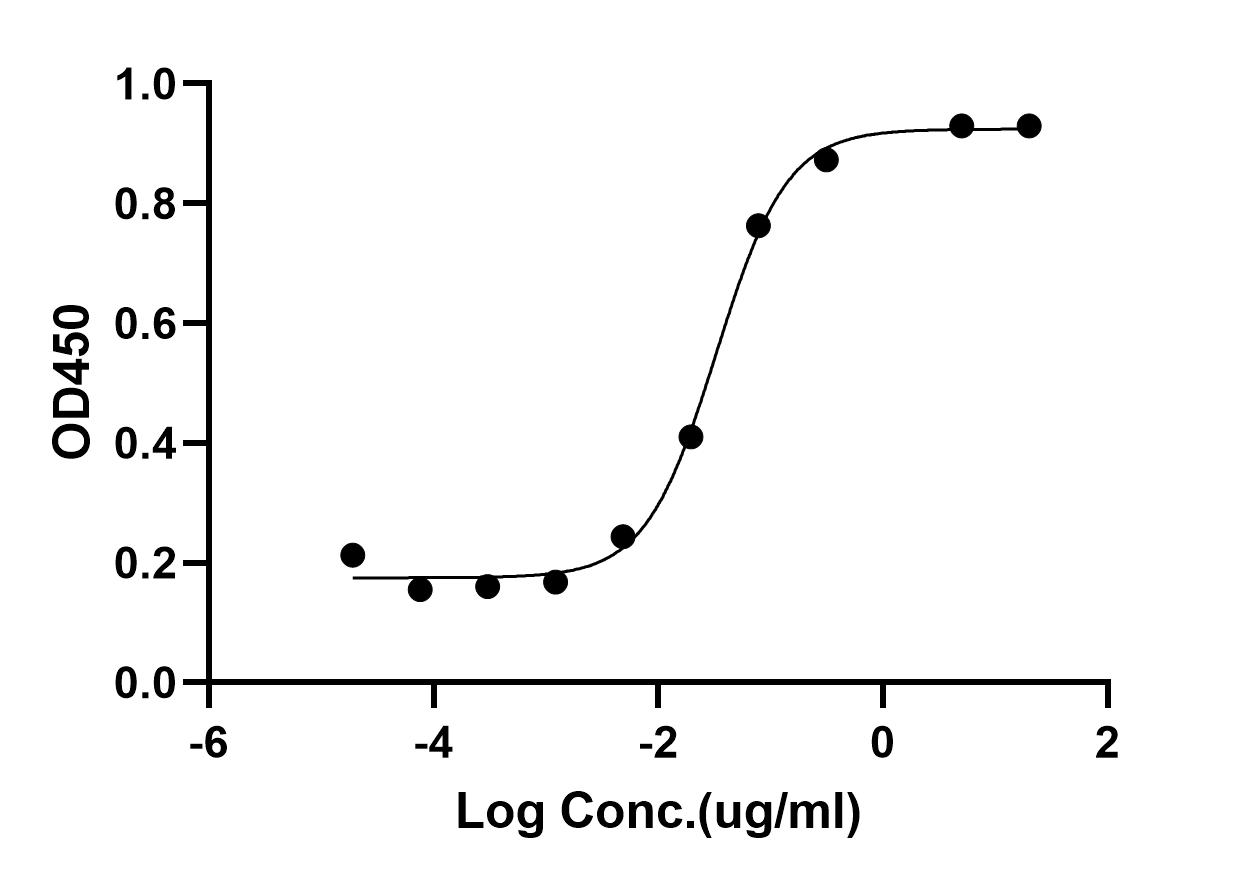CD68 (PN0098) Nb-FC recombinant antibody
- Catalog No.:YA0455
- Applications:ELISA
- Reactivity:Human
- Target:
- CD68
- Gene Name:
- CD68
- Protein Name:
- Macrosialin (Gp110) (CD antigen CD68)
- Human Gene Id:
- 968
- Human Swiss Prot No:
- P34810
- Immunogen:
- Purified recombinant Human CD68
- Specificity:
- This recombinant monoclonal antibody can detects endogenous levels of CD68 protein.
- Formulation:
- Phosphate-buffered solution
- Source:
- Camel, chimeric fusion of Nanobody (VHH) and mouse IgG1 Fc domain , recombinantly produced from 293F cell
- Dilution:
- ELISA 1:5000-100000
- Purification:
- Recombinant Expression and Affinity purified
- Concentration:
- Please check the information on the tube
- Storage Stability:
- -15°C to -25°C/1 year(Avoid freeze / thaw cycles)
- Other Name:
- CD68;Macrosialin;Gp110;CD68;CD68 nanobody;
- Background:
- This gene encodes a 110-kD transmembrane glycoprotein that is highly expressed by human monocytes and tissue macrophages. It is a member of the lysosomal/endosomal-associated membrane glycoprotein (LAMP) family. The protein primarily localizes to lysosomes and endosomes with a smaller fraction circulating to the cell surface. It is a type I integral membrane protein with a heavily glycosylated extracellular domain and binds to tissue- and organ-specific lectins or selectins. The protein is also a member of the scavenger receptor family. Scavenger receptors typically function to clear cellular debris, promote phagocytosis, and mediate the recruitment and activation of macrophages. Alternative splicing results in multiple transcripts encoding different isoforms. [provided by RefSeq, Jul 2008]
- Function:
- Could play a role in phagocytic activities of tissue macrophages, both in intracellular lysosomal metabolism and extracellular cell-cell and cell-pathogen interactions. Bind to tissue- and organ-specific lectins or selectins, allowing homing of macrophage subsets to particular sites. Rapid recirculation of CD68 from endosomes, lysosomes to the plasma membrane may allow macrophages to crawl over selectin bearing substrates or other cells.,PTM:N- and O-glycosylated.,similarity:Belongs to the LAMP family.,tissue specificity:Highly expressed by blood monocytes and tissue macrophages. Also expressed in many tumor cell lines which could allow them to attach to selectins on vascular endothelium, facilitating their dissemination to secondary sites.,
- Subcellular Location:
- [Isoform Short]: Cell membrane; Single-pass type I membrane protein.; [Isoform Long]: Endosome membrane; Single-pass type I membrane protein. Lysosome membrane; Single-pass type I membrane protein.
- Expression:
- Highly expressed by blood monocytes and tissue macrophages. Also expressed in lymphocytes, fibroblasts and endothelial cells. Expressed in many tumor cell lines which could allow them to attach to selectins on vascular endothelium, facilitating their dissemination to secondary sites.
- June 19-2018
- WESTERN IMMUNOBLOTTING PROTOCOL
- June 19-2018
- IMMUNOHISTOCHEMISTRY-PARAFFIN PROTOCOL
- June 19-2018
- IMMUNOFLUORESCENCE PROTOCOL
- September 08-2020
- FLOW-CYTOMEYRT-PROTOCOL
- May 20-2022
- Cell-Based ELISA│解您多样本WB检测之困扰
- July 13-2018
- CELL-BASED-ELISA-PROTOCOL-FOR-ACETYL-PROTEIN
- July 13-2018
- CELL-BASED-ELISA-PROTOCOL-FOR-PHOSPHO-PROTEIN
- July 13-2018
- Antibody-FAQs
- Products Images

